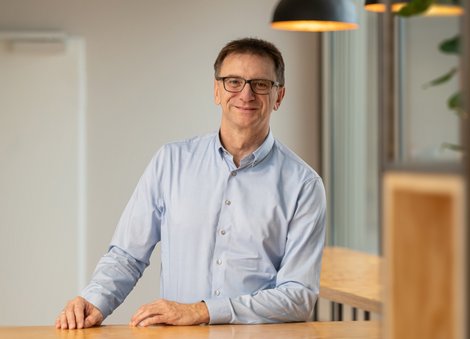A Modern Nomad Embraces Virtues, Traditions and Technology

Mercateo Director Peter Ledermann enjoys “accepting challenges”
Ledermann follows the “guiding principles of a respectable businessman,” describes himself as a “modern nomad” and sees the town of Köthen as the cradle of Mercateo, a business that has been growing for many years now. He is on the board of directors at the company, which is Europe’s leading online procurement platform for business customers. At a time when society and the economy are deeply affected by the pandemic, he is championing the town of Köthen in Saxony-Anhalt and swears by the benefits of digitalization and virtues such as honesty, reliability and integrity.
When asked about the early years, he can give an answer almost straightaway: he has all the dates, figures and anecdotes at his fingertips. The company was founded in January 2000 as a traditional start-up that aimed to revolutionize trade between companies. The founders took their inspiration for an online procurement platform from the USA and repackaged it into a new idea. They wanted to make the procurement market more transparent for small and medium-sized businesses and to make it easier for them to select and buy products. In the autumn of 2000, Ledermann joined what is now the Mercateo Group shortly after the company was founded. Many stages of development have since followed. Four years later, Mercateo began a new phase in Köthen with nine employees. Operational activities were relocated to the site in the district of Anhalt-Bitterfeld and this was where Mercateo Services GmbH was founded. “At that time, the e-commerce bubble had just burst. That made things difficult at the start,” explains Ledermann. “We were looking for a suitable business location and Köthen ticked all the right boxes.” They deliberately decided at the time not to choose a large city such as Berlin. The managers felt that everything would be too spread out, too faceless and too complicated in a big city. Köthen, on the other hand, won them over with its charm and the visible transformation taking place there. The Investment and Marketing Corporation (IMG – the state’s economic development agency) the local council, and Anhalt University of Applied Sciences and its IT faculty helped pave the way for efficient ways of working and offered very promising prospects. “And what’s more,” continues Ledermann, “we were able to find very skilled employees.” Mercateo’s business location project went smoothly and the company grew – and hasn’t stopped growing ever since.
Digital marketplace for companies
The trading company (whose name comes from the Latin “mercator,” meaning merchant) is now Europe’s leading B2B procurement platform and combines the benefits of a B2B marketplace with those of a B2B network. Mercateo’s infrastructure allows buyers, suppliers, manufacturers and service providers to link up their systems and to process their transactions with each other, regardless of how good their digital setup already is. This enables buyers and providers to make their business processes more efficient and means they can choose from a wide variety of products while also using a direct connection to their own partners and suppliers, which in Ledermann’s eyes is particularly important. He maintains that for many businesses, Mercateo has become a synonym for the digital marketplace over the years. Trade means buying and selling: the online procurement platform for business customers sells office supplies, building services engineering and electronics as well as envelopes, chef’s aprons and soldering irons. The marketplace currently offers more than 20 million items from around 700 suppliers. The business now operates across Europe and 13 new national subsidiaries have been founded in countries including Switzerland, Spain, France, Belgium and the Netherlands. 600 employees across 14 European countries are responsible for the B2B marketplace and the network unite.eu. Its headquarters in Germany were relocated from Munich to Leipzig in spring 2020, but without cutting all ties with its Bavarian site. The board explains that, as the company does not have its own storage facilities or logistics, it plans for operations to be decentralized and managed virtually in the trade fair city of Leipzig.
In light of this development, Ledermann insists that the company’s site in Köthen with its 260 employees is “hugely important.” “This is where our company culture has developed,” he explains. Even though a new head office has been set up close to the center of Leipzig whose workforce is due to move in from 2023 and will double to 500 employees, Köthen in Saxony-Anhalt remains “Mercateo’s focus.” “We have never intended to leave the area and do not plan to; if we did, we would lose the cradle that has given us our company DNA,” says Ledermann. He feels a strong bond to Köthen, and not just because of the company.
Commuting between two sites
For the past 16 years, Ledermann has been part of a two-man shared apartment. He says that he “always looks forward to the new experiences in store” when he comes to Köthen and describes himself as a “modern nomad” because he is often on the move. He commutes between Munich – where 45 staff are currently employed, where his family live and where there has been “a great deal of growth” – and Köthen. On top of that, he also travels to meet colleagues abroad. He could set up his computer anywhere, he says. “I’m used to travelling a lot and living flexibly.” He sees this as another reason why it is “very clear” that “Mercateo will continue to grow organically in this network.” He has a lot to say about the values of a respectable businessman and says: “I believe it is vital that we remain approachable and reliable, that we advance processes and that we are just as important for global players as we are for one-person companies.” Mercateo has been committed to reliability even during the pandemic. New offers were created while others were brought up to date with the digital age. The company has moved its Business Breakfast event format for potential customers online and has been organizing web conferences with up to 720 participants as well as providing expertise in its B2B Radar. This is where experts take stock of the current situation and industry leaders shed light on the challenges they face. At the beginning of March this year, Mercateo told all of its employees to work from home. “We had fortunately already got to grips with home working and developed the infrastructure to make it possible,” says Ledermann. “This meant we could keep working and providing our service.” The company has sent round an internal survey for its employees “to give them a means to express their thoughts in these challenging times and to gather information on how their working methods have changed,” he says.
Boosting the regional economy and becoming more active on the international stage
These kinds of surveys and experiences are also integrated into further training for the management. “We must learn how to lead virtually and must broaden our perspectives,” says Ledermann, who has a sufficient supply of dates, figures and stories for the future, too. He says: “We are using even more digital ways of working, expanding our solutions for working from home, and want to create of pool of qualified employees.” The company aims to increase its international focus, both internally and in terms of customers. “This will allow us to continue our own approach and to boost small and medium-sized businesses as well as the regional economy. This will benefit Köthen, just as the company itself has benefited from Köthen for so many years,” says Ledermann.
Author: Manuela Bock/IMG Saxony-Anhalt

Our pathfinders find solutions, define new goals and pave the way for opportunities arising from times of crisis. The Investment and Marketing Corporation presents them, reports on TRULY advanced researchers and developers, TRULY pioneering companies and TRULY inspiring personalities.
You will find the news and stories, the pioneer stories and portraits of "makers" HERE.
